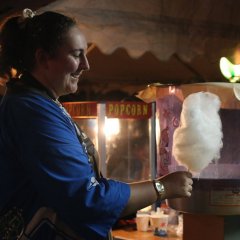Fujisan Hongu Sengen Taisha, which is the head shrine for over 1,300 Sengen shrines in Japan, has a history which pre-dates historical records. According to legend, it was built between 29BC and 70AD, founded by Emperor Suinin, the 11th emperor of Japan, in order to pacify Mount Fuji, which was active at the time. It was later rebuilt at its present location by Emperor Heizei, the 51st emperor of Japan, between 773AD and 824AD. Over the years, many famous clans have been patrons of this shrine, including the historical figure Tokugawa Ieyasu, who built the existing shrine buildings in 1604. While many of the original buildings were lost in the great earthquakes of 1633 and 1854, the inner shrine, outer shrine, and tower gate remain.
This shrine holds annual horseback archery festivals, and is considered to be the main entrance to Mount Fuji due to its position on the traditional pilgrimage path from Kyoto. Many climbers make a stop here before heading to the 5th station, halfway up the mountain, to begin their trek. The grounds actually extend to the top of Mount Fuji as well, with the land extending from the 8th station to the top being officially a part of the shrine.
Getting there
Fujisan Hongu Sengen Taisha (富士山本宮浅間大社) is located approximately a ten-minute walk from Nishi Fujinomiya station (西富士宮駅) on the JR Minobu line.
More info
Find out more about Fujisan Hongu Sengen Taisha Shrine.





















































